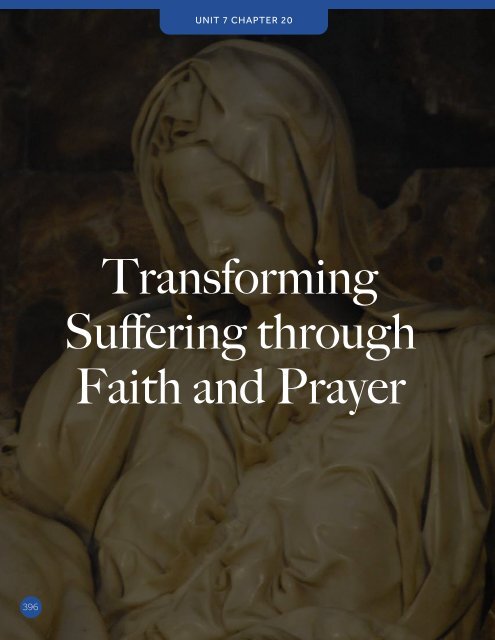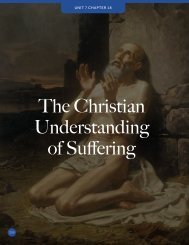CFS-WB-CH20
You also want an ePaper? Increase the reach of your titles
YUMPU automatically turns print PDFs into web optimized ePapers that Google loves.
UNIT 7 CHAPTER 20<br />
Transforming<br />
Suffering through<br />
Faith and Prayer<br />
396
Chapter 20 Overview<br />
The goal of the Christian life is to become like God, and Jesus’ most defining act of self-revelation was His<br />
offering of Himself as a sacrifice on the Cross. Among all religions of the world, Christianity alone places<br />
self-giving love above all else. Christianity alone teaches that an all-powerful God chose to enter the world<br />
humbly, offering empathy and compassion to all. And Christianity alone shows us that suffering (which will<br />
happen to us all if it has not already) is a way we can participate in the work of redemption. We can unite our<br />
suffering with Jesus’ suffering on the Cross and make a gift of it for the good of others, just like Jesus’ gift of<br />
unconditional love.<br />
At the conclusion of this chapter, you will have completed this course on Apologetics. If you were not impressed<br />
or persuaded by the content, it does not mean your faith is weak, or that you should close yourself<br />
off from believing in the future. Faith is a gift from God who ultimately respects your freedom and hopes you<br />
will freely choose to accept His invitation to follow Him. If you do, it may mean you have some measure of<br />
happiness in this life, and you will be assured of perfect happiness for eternity.<br />
In this chapter you will learn that …<br />
■ By uniting our suffering with Jesus’ on the Cross, suffering takes on an entirely new meaning and<br />
significance by becoming redemptive for the sufferer and for others.<br />
■ Among world religions, Christianity alone has made love central.<br />
■ Suffering helps move us towards agapē, increasing empathy, humility, forgiveness, and compassion, in<br />
imitation of the highest expression of agapē, Christ’s self-sacrifice on the Cross.<br />
■ If we have faith, we too can imitate Christ by offering our suffering to the Father as self-sacrifice to help<br />
in the work of redemption.<br />
■ When suffering comes, we can respond by praying, using prudence and reason, and by reshaping our<br />
expectation of happiness.<br />
Bible Basics<br />
“Behold, I make all things new.”<br />
—Revelation 21:5<br />
If one member suffers, all suffer together; if<br />
one member is honored, all rejoice together.<br />
— 1 Corinthians 12:26<br />
Connections to the Catechism<br />
■ CCC 418<br />
■ CCC 618<br />
■ CCC 1500–1501<br />
■ CCC 1503–1506<br />
© Sophia Institute for Teachers<br />
397
Chapter 20<br />
Suffering Transformed<br />
Christianity<br />
alone has made<br />
love central,<br />
giving it greater<br />
emphasis<br />
than any other<br />
religion or<br />
philosophy.<br />
From our study of suffering and the Christian understanding of it in the<br />
last two chapters, we can conclude that suffering is permitted by God<br />
to allow us to play a role in His work of salvation as part of the Body of<br />
Christ. Another way of looking at it is this: God the Father allowed His<br />
only begotten Son to suffer for our benefit; why wouldn’t He allow it for<br />
us if it contributes to the same benefit? There is no greater benefit for<br />
us than eternal life.<br />
By uniting our suffering with Jesus’ on the Cross, suffering takes<br />
on an entirely new meaning and significance. As Christ says in the Book<br />
of Revelation, “Behold, I make all things new” (Revelation 21:5).<br />
Suffering, too, is made new by Christ’s suffering and Death on the<br />
Cross. United with His redemptive suffering, the faithful’s suffering becomes<br />
redemptive for the sufferer and others. With this consequence<br />
comes peace and consolation to the sufferer as an effect of grace.<br />
God loves us so much that He became one of us. Because Jesus<br />
was fully human, He experienced all that we experience (except for sin).<br />
His suffering was real. Anything that Jesus did — from being baptized to<br />
suffering in death — was made new and made holy. So, if Jesus voluntarily<br />
did something, it must be good. Because He suffered so terribly,<br />
we can connect our suffering to His Passion on the Cross. In this way,<br />
we can participate in the redemptive quality of suffering for ourselves<br />
and for others.<br />
St. Gregory of Nazianzus wrote, “What has not been assumed has<br />
not been healed.” Christ healed humanity because He assumed humanity.<br />
Christ redeemed suffering because He suffered. Christ won victory<br />
over death because He died. And, as we reflected on in the first chapter<br />
of this unit, Christ will glorify man’s body because He rose in glory.<br />
In the last two chapters, we discussed how suffering gives us the<br />
chance to develop our natural virtues. We now move from the natural<br />
virtues to the religious virtue of agapē (love). Christianity alone has<br />
made love central, giving it greater definition and emphasis than any<br />
other religion or philosophy. As we learned in Chapter 6, agapē is the<br />
love of God for human beings and the love we are called to offer to<br />
God and one another. As we wrap up this unit on why God would allow<br />
suffering, let us consider the question: how does suffering lead us closer<br />
to agapē? Is it perhaps even necessary for agapē?<br />
398 Apologetics I: The Catholic Faith and Science<br />
© Magis Center
Agapē Begins with Empathy<br />
Agapē, the highest form of love, is a gift of self, which is frequently expressed<br />
in self-sacrifice. It is grounded in empathy with the other — we<br />
recognize the unique and intrinsic goodness, worthiness, and lovability<br />
of that other. This intrinsic goodness does not depend on any specific<br />
ability or trait the person might have (like their talents or usefulness<br />
for society). Furthermore, agapē seeks no reward, it does not seek its<br />
own interests. Agapē seeks only the goodness and lovability of others<br />
in themselves.<br />
Agapē begins with empathy and produces a sense of unity. This<br />
unity with the other breaks down interpersonal barriers rising out of<br />
self-interest. When self-centeredness closes us off, suffering can open<br />
us up. When we encounter weakness and vulnerability in another, it can<br />
prompt us to reach out in empathy and compassion. Just as important,<br />
however, our own suffering prompts us to be open enough to receive<br />
empathy. Our own weaknesses and vulnerability can break us out of our<br />
illusion of self-sufficiency and lead us to reach out to receive the help,<br />
compassion, and empathy of others.<br />
Our own suffering can lead<br />
us to receive the help and<br />
compassion of others.<br />
The Sick Child, by Edvard Munch.<br />
© Sophia Institute for Teachers<br />
Unit 7, Chapter 20: Transforming Suffering through Faith and Prayer<br />
399
Often, we have difficulty accepting help because we judge ourselves<br />
by our accomplishments, rather than our intrinsic dignity. We<br />
think that needing help means we are weak, and therefore less valuable<br />
and more of a burden. If we are to be drawn by suffering into the richness<br />
of empathy and compassion, we will have to let go of the notion<br />
that weakness and vulnerability are essentially negative and invest ourselves<br />
in Jesus’ revelation of the positivity of suffering — its invitation to<br />
eternal love and joy.<br />
Love has vulnerability built into it. It opens itself to being completed<br />
by the other; it reveals an openness to complementarity by the other.<br />
But there is a deep suspicion of and aversion to vulnerability in our<br />
St. Veronica comforted Jesus<br />
on His way to the Cross. She<br />
reminds us to see the face<br />
of Christ in every suffering<br />
person.<br />
St. Veronica with the Veil, by Mattia Preti.<br />
400 Apologetics I: The Catholic Faith and Science<br />
© Magis Center
culture. We put up a façade of being purely self-sufficient because we<br />
do not want to be needy. This façade, however, forces us to be dishonest<br />
in how we present ourselves, because even if we avoid being needy,<br />
we ultimately cannot avoid being interdependent.<br />
Weakness Reveals the Truth of Our<br />
Interdependency<br />
Here is where the opportunity and efficacy of suffering comes into<br />
play. Our personal weakness and our inability to perfectly fulfill others’<br />
needs forces us to confront the myth of perfect autonomy, which in<br />
turn points to the truth about ourselves — that we are interdependent<br />
beings and possess the ability to complement, be complemented by,<br />
serve, and be served by others.<br />
As Jesus and virtually every saint recognized, humility is necessary<br />
for the possibility of agapē. Christian teaching has always acknowledged<br />
that the wisdom and goodness of humility is not easy because<br />
it is contrary to our desire for popularity and power, by which we want<br />
our friends to love us because we are so great or we want God to love<br />
us because we are good enough and have earned His love. We are<br />
afraid to recognize that our friends, our family, and our heavenly Father<br />
all love us for ourselves and not for our illusory greatness. Once again,<br />
suffering can play an important role in opening us up to the proper perspective.<br />
We often need to experience weakness, failure, and humiliation<br />
to force us to let go of our concern with success. For many of us, it<br />
is only then that we can discover the boundless agapē love of the heart<br />
of Christ. When we can accept Christ’s love and forgiveness in humility,<br />
instead of desperately trying to prove we have earned it through pride,<br />
we will discover a new freedom.<br />
Aa<br />
VOCABULARY<br />
Forgiveness: The act of<br />
granting pardon to another<br />
for an offense committed and<br />
to no longer hold that wrong<br />
against them.<br />
Forgiveness<br />
Forgiveness is mentioned more often than any other aspect of God’s<br />
love in the New Testament. Forgiveness requires both humility and empathy<br />
because it entails letting go of a just grievance against another. If<br />
someone hurts us without meaning to, it can be excused. But if someone<br />
hurts us intentionally, forgiveness is required because we must give<br />
up our just claim to recompense. We must also give up any desire we<br />
might have for revenge, which only begets further revenge, just as violence<br />
begets violence. If we are to interrupt this ever-expanding cycle<br />
and allow the parties to begin the long process of healing, we will have<br />
to let go of our just claims against the other.<br />
© Sophia Institute for Teachers<br />
Unit 7, Chapter 20: Transforming Suffering through Faith and Prayer<br />
401
Compassion: Sympathetic<br />
concern for the sufferings of<br />
others. From the Latin for “to<br />
suffer with”.<br />
Sometimes we gain the power to forgive through a special kind of<br />
suffering — the suffering that comes with realizing that we have hurt<br />
others through mistakes or immaturity in our past and even by our deliberate<br />
sinful actions. As memories come rushing back in a new light,<br />
we suddenly grieve at the injuries we have caused. We discover a desire<br />
both for forgiveness and for God to somehow heal the injuries.<br />
Confronting our own need to be forgiven can help teach us the value<br />
in forgiving others. Empathy enables us to feel the need others had<br />
for forgiveness, and humility enables us to see that others’ need to be<br />
freed from past burdens was just as great or greater than our own.<br />
Compassion<br />
Confronting our own need<br />
for forgiveness enables us to<br />
forgive others more easily.<br />
Compassion is yet another gift that suffering helps to bring about in<br />
us. The word compassion means literally “to suffer with.” In the Parable<br />
of the Good Samaritan, Jesus showed how compassion — a feeling of<br />
St. Peter Weeping before the Virgin, by Guercino.<br />
402 Apologetics I: The Catholic Faith and Science<br />
© Magis Center
profound identification with the suffering of another human being —<br />
moves us to merciful action.<br />
Comfort sometimes takes the form of doing something beneficial<br />
such as giving medical treatment or providing housing. But frequently,<br />
we cannot do anything but give our time, presence, and attention; we<br />
can only be with the other to give comfort. Yet this seemingly small act<br />
imparts dignity. Spending time with another proves to the other that he<br />
is valuable, because most everyone intuitively recognizes the preciousness<br />
of time. There is only one hitch. We must be suffering in order to<br />
receive compassion. This is one of the most paradoxical aspects of the<br />
human condition: if we are to receive the deep affirmation of our belovedness<br />
that leads to our deepest moments of dignity and joy, we must<br />
be in a state of weakness, pain, or need.<br />
This giving and receiving of love can lead us to discover the positive<br />
cycle that comes from accepting the help of others. Showing and<br />
accepting compassion is complementary; accepting compassion can<br />
make us more aware of the genuine goodness of people. This awareness<br />
in turn calls us to imitate that goodness in them, inspiring us to<br />
greater compassion. Not surprisingly, humbly receiving love with an<br />
open heart makes us more loving.<br />
Suffering not only helps us to be more compassionate, but it can<br />
also lead to an increased awareness of the sufferings of Jesus. The<br />
price He paid to sacrifice Himself completely to create an unconditional<br />
act of love for the salvation of the world becomes less abstract and<br />
more personal. Ultimately, the example of His suffering shows us how<br />
to use our suffering as a self-offering for others. Suffering is a way we<br />
can participate in Jesus’ gift of unconditional love.<br />
Redemptive Suffering:<br />
Uniting our own suffering to<br />
Jesus’ Passion and offering<br />
it as a self-sacrifice for the<br />
sake of our salvation or the<br />
salvation of others, in imitation<br />
of Jesus.<br />
Suffering as Self-Sacrificial Redemptive Love<br />
Jesus did many things to bring the Kingdom of God to us — showing<br />
us God’s unconditional love, healings, miracles, raising the dead, His<br />
ministry of exorcism, proclaiming the Good News to sinners and the<br />
poor, and bestowing on us the gifts of the Resurrection and the Holy<br />
Spirit. Yet none of these extraordinary gifts seems to be more central<br />
to His mission of redemption and salvation than His unconditional gift<br />
of self, in letting Himself be unjustly accused, ridiculed, crucified, and<br />
put to death.<br />
Jesus’ priority here points to the intrinsic value of suffering for<br />
our redemption, and for the redemption of others. The Church calls<br />
this redemptive suffering. Of course, we need faith in Jesus, and<br />
© Sophia Institute for Teachers<br />
Unit 7, Chapter 20: Transforming Suffering through Faith and Prayer<br />
403
ecognition of love as our highest calling, to understand this supreme<br />
value of suffering. If we do have this faith, we too can offer our suffering<br />
to the Father as self-sacrifice to help in the work of redemption.<br />
Since Jesus’ act of redemption was already perfect and complete,<br />
though, how is it possible that we can help? Well, in the First Letter to<br />
the Corinthians, St. Paul speaks about Christ’s spiritual body as the unifying<br />
bond of all its members. He then notes that “If one member suffers,<br />
all suffer together; if one member is honored, all rejoice together”<br />
(1 Corinthians 12:26). The implication is clear: each individual<br />
member affects the whole body, and therefore, every member of it. If<br />
members are strong in their love, it will positively affect the whole body,<br />
and conversely, if members are weak in their love, it will weaken the<br />
whole body. Offering our suffering as self-sacrifice for the good of the<br />
Body of Christ is an act of love for the Church. So, when we offer our<br />
sufferings to the Lord as self-sacrifice, we strengthen the whole body,<br />
and therefore, every member of it.<br />
Truly, we cannot afford to waste our suffering as members of the<br />
Body of Christ. When we suffer, we need to remember to make it a<br />
self-sacrificial offering so that we can unify our sufferings to those of<br />
Jesus for the good of the body. We can make this offering through<br />
spontaneous prayers like “Lord Jesus, I want to unite my suffering with<br />
your sufferings as a self-sacrifice for the Church and the work of redemption.”<br />
We can also pray a morning offering that includes the desire<br />
to offer all our sufferings that day, and we can even pray that our suffering<br />
help specific people or intentions. We can also integrate prayers<br />
to offer our suffering into other prayers throughout the day. This has a<br />
double effect: it strengthens the Church as described above, and also<br />
transforms those making the prayer, for the more we can accept suffering<br />
in faith as our highest calling and dignity, the more we place ourselves<br />
in His hands, trusting in His loving will.<br />
So, is suffering really necessary for agapē (empathy, the acceptance<br />
of love’s vulnerability, humility, forgiveness, compassion, and the<br />
acceptance of compassion)? Not in all cases, certainly, but many of us<br />
need suffering to remove the barriers to love created by our egocentric<br />
desires, our belief in the cultural myth of self-sufficiency, and underestimation<br />
of the goodness and love of other people. God works<br />
through this suffering. He does not waste any of it. For those who are<br />
open to seeing the horizon of love embedded in it, there is a future, nay,<br />
an eternity for each of us to manifest our own unique brand of unconditional<br />
love within the symphony of love which is God’s kingdom.<br />
404 Apologetics I: The Catholic Faith and Science<br />
© Magis Center
What To Do When Suffering Comes<br />
Even if we feel that we may not be ready to face suffering when it<br />
comes, there are steps we can take to lessen the negative effects of<br />
suffering when it begins. First, we can immediately engage in spontaneous<br />
prayers, such as the Lord’s Prayer, the Hail Mary, or as simple a<br />
prayer as “Help me, Lord.” Second, we can lessen the effects of fear<br />
and anxiety through natural virtues.<br />
For example, we can use reason and prudence to confront fear and<br />
anxiety. For example, we can ask, “Can any part of this problem be averted<br />
or lessened?” and “If everything goes wrong, what are some backup<br />
plans I can live with?” and “Who can help me with advice or action?” We<br />
can seek the help of other people we trust. Some may be supportive by<br />
bringing comfort and helping us feel less alone, and some may give us<br />
specific, practical suggestions for overcoming problems.<br />
Prudence: “Right judgement.”<br />
A Cardinal Virtue that helps<br />
guide all of the other virtues<br />
because it helps us to discern<br />
the true good in every<br />
circumstance. It helps us to<br />
make the right decision at<br />
the right time and to find the<br />
best way to achieve a good<br />
outcome.<br />
We can rejoice even in<br />
suffering, as Christ has<br />
conquered death.<br />
Anastasis, Harrowing of Hell and Resurrection fresco from Chora Church, photograph by Gunnar Bach.<br />
© Sophia Institute for Teachers<br />
Unit 7, Chapter 20: Transforming Suffering through Faith and Prayer<br />
405
Resignation: Acceptance<br />
of God’s will in our lives,<br />
especially in times of difficulty<br />
and suffering.<br />
We can also reshape our expectation of happiness. You may have<br />
heard it said that much of our happiness depends on what we think will<br />
make us happy. Even though we may believe we cannot be happy without<br />
a particular person, job, home, or good health, it probably is not true.<br />
Many people have learned to be happy after losses, sometimes finding<br />
whole new kinds of happiness. How do they do this? They change their<br />
expectation of what is required for happiness. They stop telling themselves<br />
they need the things they have lost, and tell themselves they<br />
can be happy without them. If we do the same, we will likely find a new<br />
way of life and may even be happier than before. Remember what we<br />
learned about the comparison game in Unit 6; the same wisdom applies<br />
here as well. One sure way to add anxiety to our moments of suffering<br />
is to compare ourselves to what we were like before the loss, or to others<br />
who have not experienced the loss.<br />
Ultimately, we have two options: we can persist in resentment and<br />
bitterness and resolve to tough it out by ourselves, or we can practice<br />
Christian resignation by placing ourselves in the loving hands of God<br />
and move forward trusting that He knows what we need and how we<br />
can best become instruments for the good of others.<br />
Conclusion<br />
Our journey in this course has now reached its end. We have come a<br />
long way since we began by considering the medical evidence for our<br />
transphysical souls. We have shown that it is reasonable and responsible<br />
to conclude that God exists, first by examining the evidence presented<br />
to us by the sciences, then by considering the knowledge of God<br />
available to us by the use of human reason. We have contemplated how<br />
the Creator has revealed Himself to us, made known His unconditional<br />
love — agapē — and that He has dwelled among us as Emmanuel, “God<br />
with us” in the divine person of His Son, Jesus Christ. We have explored<br />
the historical evidence for Christ and demonstrated that His claim to<br />
be God is true. Equipped with all this evidence, we have gained greater<br />
confidence in the veracity of Jesus’ revelation of God and what it<br />
means for how we live our lives, pursue happiness in Him, and face the<br />
inevitable suffering that will come our way.<br />
In short, we have crafted a defense of the bedrock truths of the<br />
Christian Faith using the most compelling and convincing tools at our<br />
disposal, leaving but one question at this conclusion: “Will you choose<br />
to believe in and follow God and His Son?” All the best evidence in<br />
the world will not compel us to believe in and follow God and His Son,<br />
406 Apologetics I: The Catholic Faith and Science<br />
© Magis Center
Jesus. We must choose to do this through the help of God’s grace (for<br />
faith is a free gift of God), because God does not want to push us or<br />
overwhelm us into believing. Rather, He wants us to recognize that love<br />
(agapē) is the highest and most positive purpose of life, that He and<br />
His Son are perfect unconditional love, and that the way to actualize<br />
that life of love is through following the teaching of His Son. We do so<br />
by practicing the Faith and following His moral teaching. If we recognize<br />
these three truths of the heart, and choose to follow the Lord’s<br />
teaching, we will find ourselves happier (on all four levels), undaunted<br />
in suffering, solidly on the path to eternal salvation, leaving a legacy of<br />
contribution to this world and the Kingdom of God, and leading the culture<br />
and Church in the most grace-filled ways. All we need do is recognize<br />
Christ the Lord, choose Him, and follow Him in practice and His<br />
teachings. The rest will be the grace and fruit of the Holy Spirit working<br />
through our remarkable lives.<br />
If we chose to follow the Lord,<br />
we will find ourselves happier,<br />
undaunted in suffering, and<br />
solidly on the path to salvation.<br />
Pentecost, by Juan Bautista Maíno.<br />
© Sophia Institute for Teachers<br />
Unit 7, Chapter 20: Transforming Suffering through Faith and Prayer<br />
407
Focus and Reflection Questions<br />
1 How does Christ’s suffering and Death on the Cross make suffering new? What comes with this<br />
renewal?<br />
2 What does it mean to say that agapē is grounded in empathy for the other?<br />
3 What are some reasons we may have trouble accepting help when we are suffering or otherwise in<br />
need?<br />
4 What good things may happen when weakness, failure, and humiliation force us to let go of our<br />
concern with success?<br />
5 Why does forgiveness require both humility and empathy?<br />
6 What does the word compassion mean? What does Jesus teach us about it in the Parable of the<br />
Good Samaritan?<br />
7 What is the positive cycle that can come about when we give and receive compassion?<br />
8 In what are we able to participate by our suffering?<br />
9 In what ways does Jesus’ ministry show us that suffering has the highest value for our redemption,<br />
and for the redemption of others?<br />
10 If Jesus’ act of redemption was already perfect and complete, how is it possible that we can help by<br />
offering up our own suffering?<br />
11 What are some ways that we can unify our sufferings to Jesus’ for the good of His Body, the Church?<br />
12 How can using our reason and prudence help us deal with suffering?<br />
13 Why can changing our expectations of happiness help us when we are suffering?<br />
14 Given all the evidence presented in this course supporting the veracity of Jesus’ revelation of God,<br />
what question remains at the conclusion of this course?<br />
408 Apologetics I: The Catholic Faith and Science<br />
© Magis Center
Straight to the Source<br />
ADDITIONAL READINGS FROM PRIMARY SOURCES<br />
The Story of a Soul, Selection from the Epilogue, St. Thérèse of Lisieux, 1898<br />
“When I suffer much,” she would say, “when something painful or disagreeable happens to me, instead<br />
of a melancholy look, I answer by a smile. At first I did not always succeed, but now it has become a habit<br />
which I am glad to have acquired.... No — [my sufferings] are not terrible: can a little Victim of Love find<br />
anything terrible that is sent by her Spouse? Each moment He sends me what I am able to bear, and<br />
nothing more, and if He increase the pain, my strength is increased as well. But I could never ask for<br />
greater sufferings — I am too little a soul. They would then be of my own choice. I should have to bear<br />
them all without Him, and I have never been able to do anything when left to myself.<br />
1 Why did St. Thérèse believe her sufferings were not terrible?<br />
2 What did St. Thérèse see as the difference between the sufferings sent to her by Christ and suffering<br />
of her own creation, or that she would ask for?<br />
The City of God, Book 1, Ch. 29, St. Augustine, AD 426<br />
The whole family of God, most high and most true, has therefore a consolation of its own — a consolation<br />
which cannot deceive, and which has in it a surer hope than the tottering and falling affairs of earth<br />
can afford. They will not refuse the discipline of this temporal life, in which they are schooled for life<br />
eternal; nor will they lament their experience of it, for the good things of earth they use as pilgrims who<br />
are not detained by them, and its ills either prove or improve them. As for those who insult over them in<br />
their trials, and when ills befall them say, “Where is your God?”, we may ask them where their gods are<br />
when they suffer the very calamities for the sake of avoiding which they worship their gods, or maintain<br />
they ought to be worshipped; for the family of Christ is furnished with its reply: our God is everywhere<br />
present, wholly everywhere; not confined to any place. He can be present unperceived, and be absent<br />
without moving; when He exposes us to adversities, it is either to prove our perfections or correct our<br />
imperfections; and in return for our patient endurance of the sufferings of time, He reserves for us an<br />
everlasting reward.<br />
1 What is the consolation of Christians — the family of God?<br />
2 What reason does St. Augustine give for suffering, or adversity? What reward is there for enduring<br />
suffering?<br />
3 Do you think St. Augustine’s view of suffering is optimistic? Why or why not?<br />
© Sophia Institute for Teachers<br />
Unit 7, Chapter 20: Transforming Suffering through Faith and Prayer<br />
409
Salvifici Doloris 26–27, an Encyclical Letter of Pope St. John Paul II, February 11, 1984<br />
26. …Christ does not explain in the abstract the reasons for suffering, but before all else he says: “Follow<br />
me!” Come! Take part through your suffering in this work of saving the world, a salvation achieved<br />
through my suffering! Through my Cross. Gradually, as the individual takes up his cross, spiritually uniting<br />
himself to the Cross of Christ, the salvific meaning of suffering is revealed before him. He does not<br />
discover this meaning at his own human level, but at the level of the suffering of Christ. At the same<br />
time, however, from this level of Christ the salvific meaning of suffering descends to man’s level and<br />
becomes, in a sense, the individual’s personal response. It is then that man finds in his suffering interior<br />
peace and even spiritual joy.<br />
27. Saint Paul speaks of such joy [in uniting our suffering to Christ’s] in the Letter to the Colossians: “I rejoice<br />
in my sufferings for your sake.” A source of joy is found in the overcoming of the sense of the uselessness<br />
of suffering, a feeling that is sometimes very strongly rooted in human suffering. This feeling<br />
not only consumes the person interiorly, but seems to make him a burden to others. The person feels<br />
condemned to receive help and assistance from others, and at the same time seems useless to himself.<br />
The discovery of the salvific meaning of suffering in union with Christ transforms this depressing feeling.<br />
Faith in sharing in the suffering of Christ brings with it the interior certainty that the suffering person<br />
“completes what is lacking in Christ’s afflictions;” the certainty that in the spiritual dimension of the<br />
work of Redemption he is serving, like Christ, the salvation of his brothers and sisters. Therefore, he is<br />
carrying out an irreplaceable service. In the Body of Christ, which is ceaselessly born of the Cross of the<br />
Redeemer, it is precisely suffering permeated by the spirit of Christ’s sacrifice that is the irreplaceable<br />
mediator and author of the good things which are indispensable for the world’s salvation. It is suffering,<br />
more than anything else, which clears the way for the grace which transforms human souls. Suffering,<br />
more than anything else, makes present in the history of humanity the powers of the Redemption.<br />
…Those who share in the sufferings of Christ preserve in their own sufferings a very special particle of<br />
the infinite treasure of the world’s Redemption, and can share this treasure with others. The more a person<br />
is threatened by sin, the heavier the structures of sin which today’s world brings with it, the greater<br />
is the eloquence which human suffering possesses in itself. And the more the Church feels the need to<br />
have recourse to the value of human sufferings for the salvation of the world.<br />
1 What reason does the pope give for why Jesus does not explain in the abstract the reasons for<br />
suffering?<br />
2 How does responding to suffering with joy transform it?<br />
3 What are some practical ways you can find joy in your own sufferings?<br />
410 Apologetics I: The Catholic Faith and Science<br />
© Magis Center
















